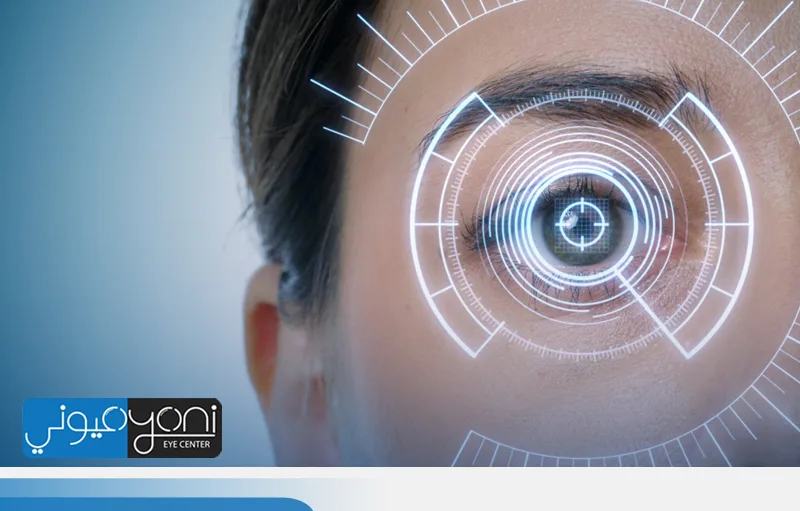Removing the natural lens and replacing it with an artificial one may not sound pleasant to everyone, but it is often the best and sometimes the only solution for treating severe vision impairment caused by cataracts. In this article, we discuss the most important questions about lens implantation, its complications, and its cost in Dubai.
What is lens implantation surgery?
Lens implantation surgery is the replacement of the damaged natural lens with a clear artificial intraocular lens. Ophthalmologists perform this procedure to treat patients with cataracts, as the condition causes chemical changes in the eye’s proteins, which affect lens transparency and lead to blurred vision.
Eye specialists also consider lens implantation an effective option for treating certain cases of astigmatism when other treatment methods fail.
What are the symptoms of cataracts?
Doctors recommend lens implantation when the patient experiences the following symptoms:
- Double vision.
- Cloudy or blurred vision.
- Difficulty seeing at night, especially for drivers who struggle to see clearly during nighttime driving.
- Sensitivity to bright lights and inability to tolerate direct sunlight.
- Seeing halos or colored rings around bright light sources.
How should I prepare before lens implantation?
The patient should visit the ophthalmologist before undergoing lens implantation to perform the necessary medical tests. These tests help determine the condition of the eye and accurately measure the power of the new artificial lens.
The doctor may also ask the patient to use prescribed eye drops several days before surgery and stop certain medications. The patient must stop wearing contact lenses at least one week before surgery.
What are the steps of lens implantation surgery?
The doctor performs lens implantation to treat severe vision impairment caused by cataracts through the following steps:
- Applying topical anesthesia to ensure the patient feels no pain.
- Some patients may feel anxious, so the doctor may give a mild sedative.
- Creating a small incision to access the natural lens.
- Breaking the natural lens into tiny pieces to make removal easier.
- After removing the natural lens, the doctor places the artificial intraocular lens in its position.
- No stitches are required, as the incision seals naturally.

Lens Implant Surgery
Can the patient leave the hospital immediately after lens implantation?
Not immediately. The ophthalmologist must examine the eye first to ensure it is safe before allowing the patient to go home.
Are there complications after lens implantation?
Although the procedure is highly successful, some patients may experience:
- Slightly blurred vision.
- Near-sightedness or far-sightedness.
- The doctor may recommend wearing glasses to improve visual clarity after surgery.
How much does lens implantation cost?
Lens implantation can be expensive in many countries, making it difficult for some patients to undergo the procedure.
Today, cataract patients can undergo lens implantation in Dubai with highly skilled eye surgeons at significantly lower cost than international prices, while maintaining high-quality standards. Prices may vary depending on the surgical center, the type of artificial lens, and the technology used.
What are the most important post-operative instructions?
The doctor provides the patient with several instructions after lens implantation, such as:
Wearing medical glasses.
Avoiding touching or rubbing the eyes.
Staying away from smoky or dusty environments.
You can learn more postoperative tips when contacting Dr. Tarek Abdelsamie.

Procedure details of lens implantation
Post-operative instructions
- No exposure to dust for two days to avoid infection.
- No rubbing the eyes for one week.
- No makeup or eyeliner for one week.
- No colored contact lenses for one month.
- No sports involving eye contact (football, swimming, etc.) for one month.
- Face washing, ablution, and showering are allowed the same day, but without rubbing the eyes.
- Praying (prostration) is allowed after 1–2 days.
- Using mobile phones, computers, or watching TV is allowed from the next day, but eye strain should be avoided for the first week.
Surgery duration
Between 5 to 10 minutes per eye. Both eyes are usually treated in the same session.
Required tests before lens implantation
- Refraction test (glasses prescription)
Corneal imaging (Pentacam) - Anterior chamber depth (AC Depth)
- White-to-white measurement
- You may perform these tests before traveling and send them to us by email or mobile. Only two days of rest are needed before travel.






